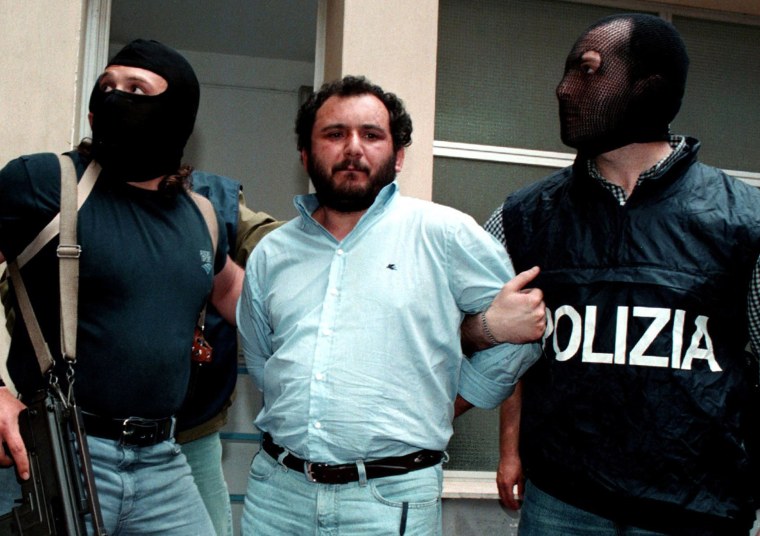A notorious Sicilian mafia figure known as “U Scannacristiani” or “The People-Slayer” has been released from prison, sparking outrage in Italy.
Giovanni Brusca, 64, confessed to murdering more than 100 people including Giuseppe Di Matteo, the 14-year-old son of a mafia informant.
Di Matteo was kidnapped and held for almost two years before he was strangled to death and his remains dissolved in acid because his father was thought to be collaborating with the police, Brusca told authorities.
Arrested in May 1996, the following year, Brusca was sentenced to 26 years for the murder of Giovanni Falcone, a prominent anti-mafia judge, whom he killed with a remotely detonated bomb in 1992.
Download the NBC News app for breaking news and politics
The Falcone killing, followed two months later by that of fellow anti-mafia magistrate Paolo Borsellino, was one of the most notorious episodes in Italy's long and violent struggle against organized crime.
Brusca was also sentenced to 30 years for Di Matteo’s murder in 1999.
Facing a lifetime behind bars, the following year, he agreed to work with prosecutors and confessed to over 100 murders in exchange for a reduced sentence.
He also supplied investigators with information on several deadly Cosa Nostra attacks carried out in the 1980s and 1990s and testified in a trial over alleged negotiations between Italian officials and mobsters to stop the bombings.
Although his release has long been expected, it has been criticized by Italian politicians and the families of his victims including Falcone’s sister.
Maria Falcone said she feared the release of “an individual capable of so much evil” in a statement posted to the Facebook page of the Giovanni Falcone Foundation, an anti-mafia organization launched in memory of her brother.
Although her brother would have wanted the law — and therefore, Brusca’s release — to be respected, she said, the families of Brusca’s victims would have to contend with “the pain, the anger and the fear that an individual capable of so much evil could go back to crime.”
She added that not enough was known about his initial “collaboration with justice” and it was “full of shadows.”
Luciano Traina, who arrested Brusca after losing his brother and fellow police officer to mafia violence, told Italian newspaper la Repubblica that he would “never forgive” him.
Political leaders including former Italian prime minister and leader of the center-left Democratic Party Enrico Letta have also criticized Brusca’s release. Letto told the RTL 102.5 radio station that the news came as a "punch in the stomach."
Former interior minister and leader of the far-right League party Matteo Salvini wrote on Facebook that it was “not the justice Italians deserve.”
However, Italy's chief anti-mafia prosecutor, Federico Cafiero De Raho, urged people to remember that he had collaborated with authorities.
"Let us not forget that he gave information on bombings both in Sicily and in mainland Italy," he told Reuters.

